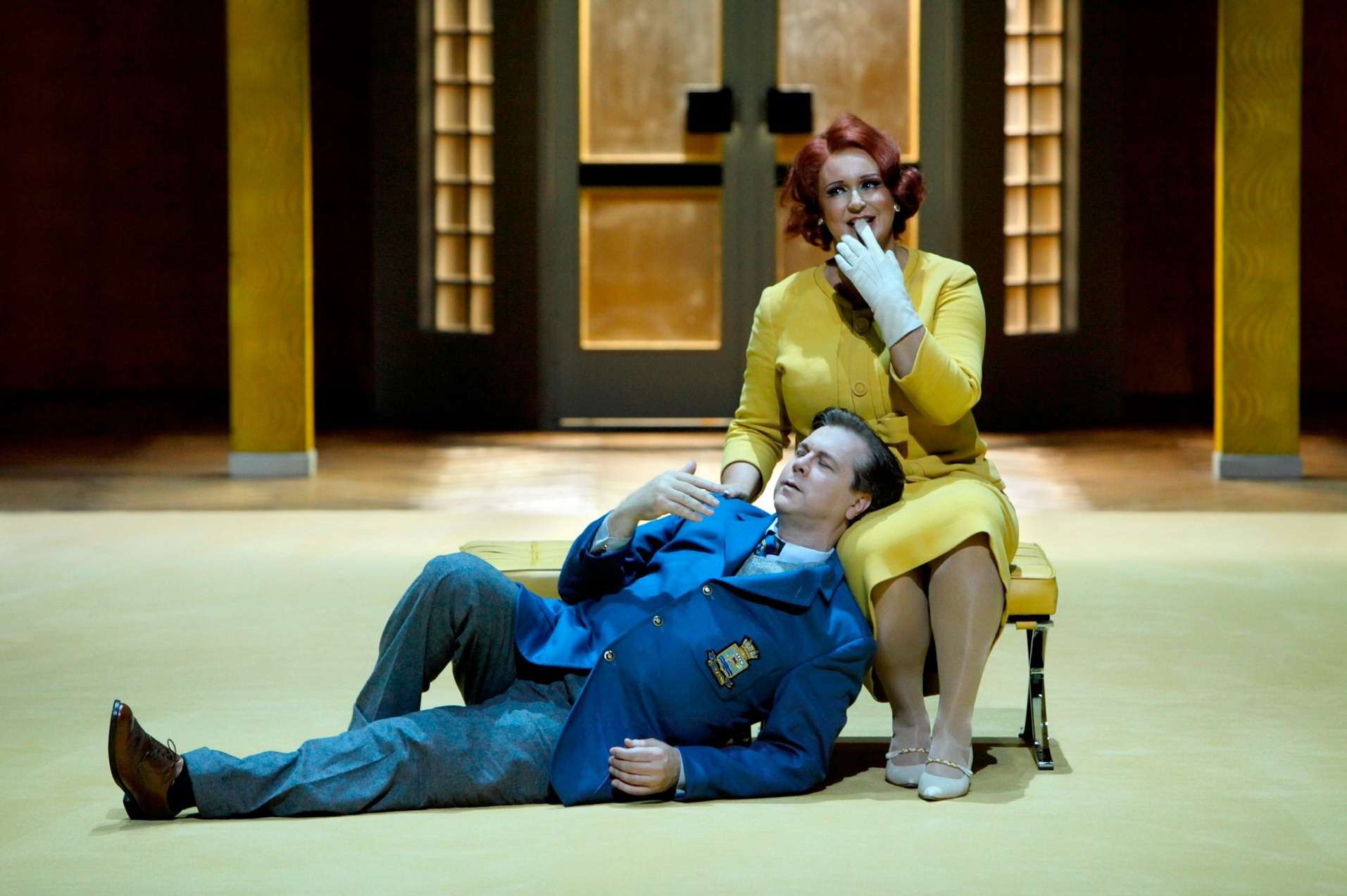|
Back
Another Outing of a Tired Tristan Bayreuth
Bayreuther Festspiele
07/26/2012 - & August 1, 7*, 14, 20, 26, 2012
Richard Wagner: Tristan und Isolde
Robert Dean Smith (Tristan), Irene Theorin (Isolde), Kwangchul Youn (King Marke), Jukka Rasilainen (Kurwenal), Michelle Breedt (Brangäne), Ralf Lukas (Melot), Arnold Bezuyen (shepherd), Martin Snell (steersman), Clemens Bieber (young seaman)
Bayreuther Festspiele Orchestra and Chorus, Peter Schneider (conductor)
Christoph Marthaler (director), Anna Viebrock (sets and costumes)

R. D. Smith & I. Theorin (© Enrico Nawrath)
Another revival of Christoph Marthaler’s Tristan und Isolde seems a little superfluous. Since its introduction, audiences and critics have bewailed the production’s drab sets and costumes and tightly controlled modes of expression. Why the characters must be explored with such intense constraint of action and motion continues to cause much consternated derision. For some time, the consensus among theater directors everywhere has appeared to be that Tristan demands an absence of action to communicate the opera’s essential erotic tension. This idea could be worth exploring, but after so many attempts Wagner’s longueurs seldom seem to work satisfactorily with the concept, especially in the pulsating second act love scene. However oddly for an opera composed as a monument to eternal love, it is now virtually axiomatic that Tristan and Isolde may never touch. The most meaningful action they share in this production is the removal of Isolde’s beige gloves. The rest of the time everyone is literally buttoned up in dowdy costumes that recall some of the more regrettable fashion statements of the middle decades of the twentieth century. The only Celtic elements are Brangäne’s plaid skirt and Kurwenal’s kilt. Movement, gesture, and expression are minimized as much as possible. But why we know not. Grim surroundings dominated by ugly browns, yellows, and grays barely suggest the opera’s natural setting cause the action to descend, with compressed versions of each previous act’s sets rising above the stage. After too many of these excruciating limitations, it could well be that the most radical new production concept would be to place a great big ship on the stage in Act I, design a magic garden for Act II, and drop a sprawling castle on Act III. And how refreshing it would be to have a Tristan and Isolde who are all over each other instead of sitting quietly!
It can be a true let down when the vocal talent on display in such a production is as fine as it was in this performance. Irene Theorin’s Isolde ruled the stage with power and authority that in no way undermined a touching delicacy and sweetness of sound. The notes soared with effortless beauty over the orchestra, as only voices in Bayreuth can do, without a hint of strain or fatigue. Robert Dean Smith continues as one of Europe’s reigning Heldentenors. His Tristan held up all evening with superb projection and, given the constraints of the production, a surprising dynamism in the treacherous third act monologues. Luxury casting also prevailed in the supporting roles. The solid Korean bass Kwangchul Youn’s Marke was a model of pathos. As he did in the role of Gurnemanz two nights before, the low notes resonated with purring authority. Jukka Rasilainen sang Kurwenal with an expansive reach that suggests the leading Wagner roles he regularly performs elsewhere. Doubling as Venus in this year’s festival, Michelle Breedt delivered Brangäne with superb intelligence. Arnold Bezuyen’s shepherd, Martin Snell’s steersman, Ralf Lukas’s Melot, and veteran Bayreuth performer Clemens Bieber’s young seaman all added superb efforts. Stalwart conductor Peter Schneider led a cautious orchestral performance. Although he took few risks in the great moments, he admirably captured low timbres with a reading that threatened the deathly grip of eros.
Paul du Quenoy
|